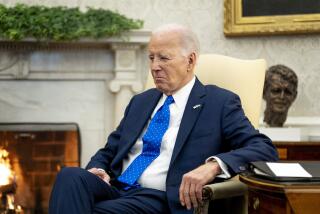To thine own selfie be true -- literally
- Share via
Taking photos of ourselves is the signature act of our times. We know this not because the president snapped one with world leaders at Nelson Mandela’s memorial service Tuesday, but because “selfie” is the Oxford English Dictionary’s Word of the Year.
And as you may read more than once in the weeks since the Nov. 19 announcement, this is a sign of the apocalypse. Just about every blogger, columnist and style reporter has deemed selfie-mania a pernicious outgrowth of the era’s unparalleled narcissism.
Naturally, there’s been a backlash to the backlash. Others in the commentariat have rightly pointed out that our self-obsession, while certainly notable, is being driven more by technology than a visceral shift in our cultural psyche. People have always taken photos of themselves, either with camera timers or by handing their Nikons over to strangers in foreign countries and then paying large sums to get them back. The automated photo booth was an instant hit in the 1920s, but it’s easy to imagine grouchy newspaper columnists observing the phenomenon and declaring the entire flapper generation a bunch of vain, naval-gazing brats.
YEAR IN REVIEW: 10 tips for a better life from The Times’ Op-Ed pages in 2013
This grouchy columnist is more concerned about a different ruling by the OED. It was actually issued a few years ago, though the media didn’t notice until last spring, so I believe it has a rightful place on 2013’s timeline of dubious developments.
I am talking about the OED’s decision to expand “literally” so that it also means “figuratively.” The entry defines the adverb “literally” as “in a literal manner or sense; exactly: the driver took it literally when asked to go straight over the roundabout. “ But then it adds a note: “informal, used for emphasis while not being literally true: I have received literally thousands of letters.”
The latter, say the editors, “is not acceptable in formal contexts, though it is widespread.”
YEAR IN REVIEW: Ted Rall’s five best cartoons of 2013
Not acceptable in formal contexts? Then the Democratic National Convention must be a pretty relaxed affair. That’s where Vice President Joe Biden, in his 2012 address, famously used the “L-word” nine times, including in patently metaphorical statements like “literally, [killing Osama Bin Laden] was about healing an unbearable wound.”
His affinity for the word caused some on Twitter to suggest that if you’d taken a drink every time he said it, you’d have passed out before he finished.
Then, in August, Sarah Palin was sufficiently worried about violence in Egypt and the president’s vacation schedule to say “literally, all hell seems to be breaking loose and ... Obama is ... having a gay old time.”
And though you’d think that British parliamentarians would be above such things, it turns out they are not immune. When British Deputy Prime Minister Nick Clegg referred last year to “people literally in a different galaxy who are paying extraordinarily low rates of tax,” he wasn’t talking about the residents of Ursa Major.
Clegg, at least, managed to spark a debate, with the language police crying foul and others offering reminders that as far back as 1903, the OED was cautioning “literal” users to “stop, look, and think before using the word in any manner short of its exact sense.”
Much of the magic of language, of course, lies in its fluidity. The OED has long been in the business of not only defining words but also tracing their evolution. And the fact that several dictionaries have followed the OED’s lead suggests that being conservative on “literal” is being on the wrong side of history. But, I’m sorry: “Literal” does not mean the same thing as “not at all literal.”
It is not a contranym, like “sanction,” which means both to punish and to condone, or “garnish,” which means both to add on and to take away. It’s a plain old word with a plain old meaning. Misusing it is cheating. It’s talking or (worse) writing without accountability. It essentially cues the listener to stop listening. It’s the ultimate enabler of hyperbole.
The logic of “if you can’t beat them, join them” works for some things — for instance, Republicans coming around on gay rights — but not so much when it comes to language. If we cave on “literally,” it will only be a matter of time before we’ll be granting equal rights to “irregardless.”
And all the selfies in the world aren’t as apocalyptic as that.
Twitter: @meghan_daum
More to Read
A cure for the common opinion
Get thought-provoking perspectives with our weekly newsletter.
You may occasionally receive promotional content from the Los Angeles Times.











